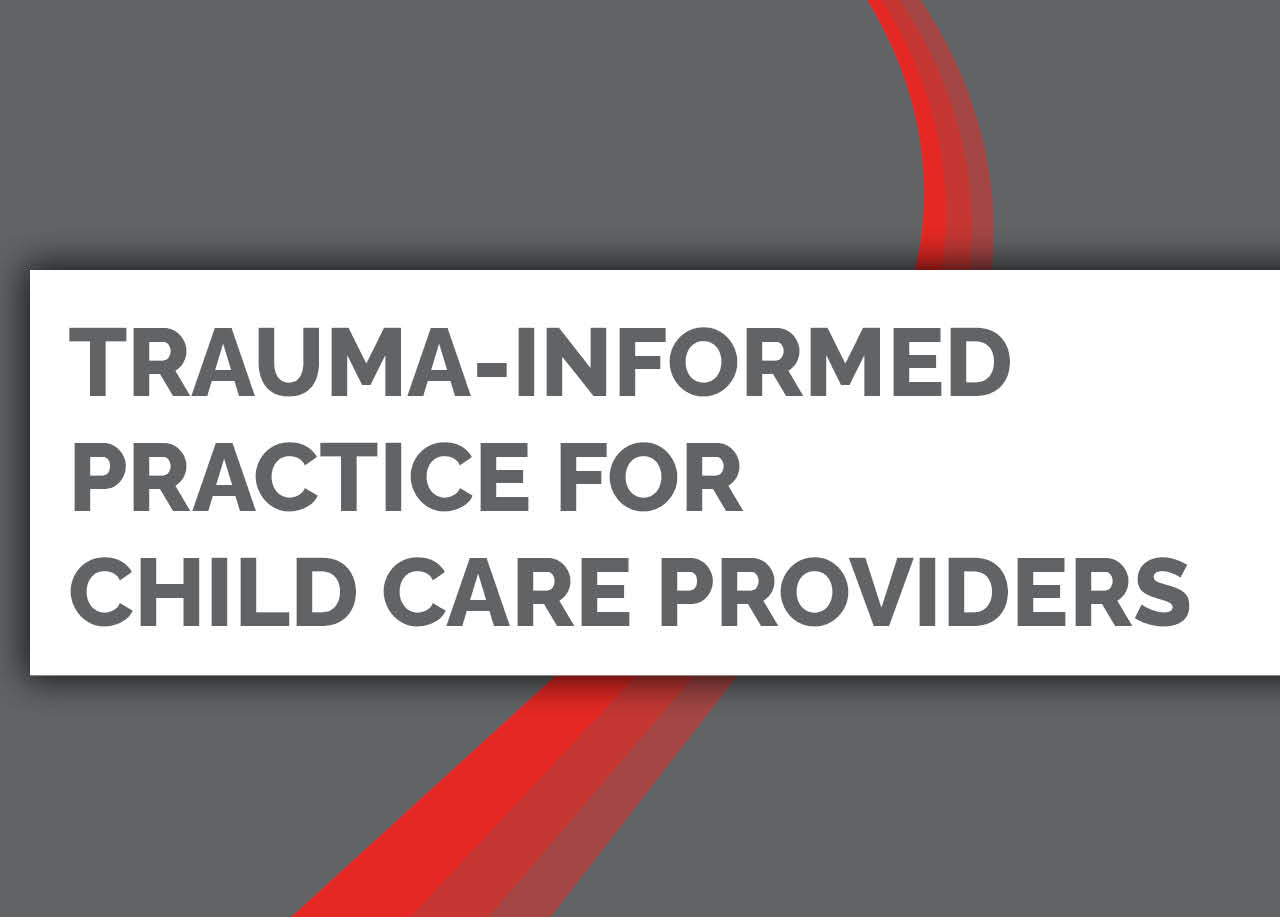The organizations and sites listed on this page offer Registry Approved training for Illinois child care providers. These links take you to pages outside of the Gateways i-learning System, and INCCRRA and Gateways are not responsible for technical assistance or support for any content provided through these entities.
Search results: 60
This training is required for all Registry-Approved trainers, including ITN trainers. The purpose of this training is to share quality practices for training adults.

An Introduction to Transitions discusses the effects of various types of transitions - including activity, classroom, program, family, and community - on families and a child's learning and development. This course will provide strategies to assist families in times of transition, as well as, identify specific types of transitions that impact children and families.
This Registry-approved training is brought to you by Gateways to Opportunity®. This training is ExceleRate-approved and counts towards ExceleRate™ Illinois for licensed child care centers and DCFS licensed program training hours.
Esta capacitación está disponible en español aquí.

In this training, participants will learn about the complexities of culture and how culture impacts interactions with families and other professionals. Through discussion and narrated activities, participants will explore their own cultural competence and awareness. This Registry-approved training is brought to you by Gateways to Opportunity. This training is ExceleRate-approved and counts towards ExceleRate™ Illinois for licensed child care centers and DCFS licensed program training hours.
Contact Hours: 2.5 hours Gateways Content Areas: IRE (1.5 hours); FCR (1 hour) CDA Content Areas: 4 (1.5 hours); 6 (1 hour)Esta capacitación está disponible en español aquí.
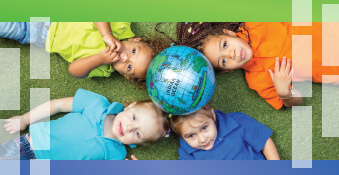
This
training will provide a brief overview of the Pyramid Model as a framework
for building social emotional skills for ALL children in Illinois, beginning with infants and young children. The goal is familiarity, not competence.
Each level of the Pyramid will briefly be discussed and a small portion of its content will be highlighted. The importance of the framework is also considered along with next steps to learn more about the Pyramid Model.
Contact Hours: 1 hour Gateways Content Area: PPD (1 hour) CDA Content Area: 6 (1 hour)
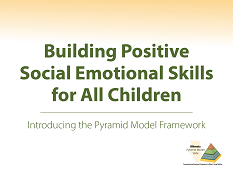
This course is intended to provide ECE, CFC, and LEA staff
and administrators with a deeper understanding of the available tools and
resources to help foster partnerships and implement best practices that promote
inclusion. Building Relationships to
Support Inclusion in Early Childhood: Tools to Support your Efforts is
brought to you by the Illinois Early Learning Council Inclusion Subcommittee,
in collaboration with state agency partners at the Governor’s Office of Early
Childhood Development, Illinois State Board of Education, and the Illinois
Department of Human Services.
Contact Hours: 1 Hour Gateways Content Areas: IRE (1 hour) CDA Content Areas: PRO (1 hour)
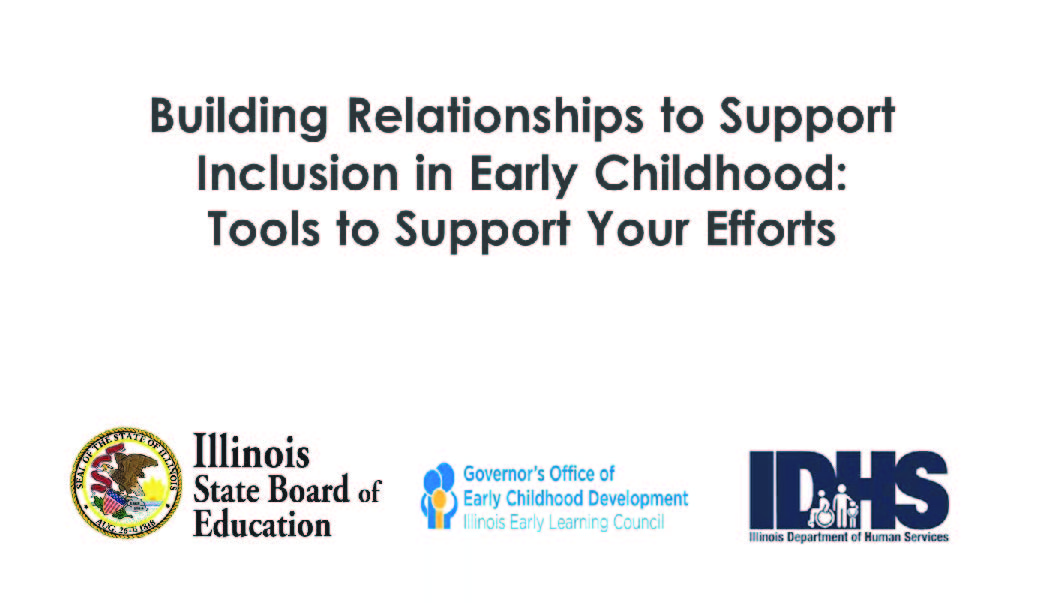
Community Systems Development (CSD) impacts all aspects and all staff in the CCR&R System in some way. This introductory training to Community Systems Development was created to give a simple overview and help build the culture of CSD for all CCR&R staff. Through reading material, activities, and presentations, participants will learn some key terms and components of Community Systems Development philosophies.
Contact Hours: 2 Gateways Content Areas: PPD (2 hours) CDA: PRO (2 hours)
One of the distinguishing characteristics of high-quality organizations is their ability to adapt to change. This training will explore the concept of Continuous Quality Improvement (CQI) as an essential component of first-rate agencies. Through reading material, activities, and presentations, participants will learn the key features of this leadership philosophy, the steps in the CQI process, and how to create a Continuous Quality Improvement Plan (CQIP) to guide change.
Contact Hours: 2 hours Gateways Content Areas: PPD (2 hours) CDA Content Areas: PRO (2 hours)
This training will provide participants an overview of child development, health, and safety issues for children birth through early school-age. Emphasis will be on understanding patterns of development, developmental domains, and the role of nutrition in development. In addition, health and safety issues will address supporting the growth of healthy children - from the basics such as handwashing to more in-depth practices surrounding healthy procedures and disease prevention. Participants will learn more about emergency planning/preparedness and first aid as well as identify tips for maintaining safe indoor/outdoor environments.
Contact Hours: 3 hours Gateways Content Areas: HGD (1.5 hrs) HSW (1.5 hrs) CDA Content Areas: 1 (1.5 hrs) 8 (1.5 hrs)
Esta capacitación está disponible en español aquí.
Welcome to the Customer Service and Field Safety: Essential Skills for CCR&R Staff training. During this training you will learn the importance of providing excellent customer service to child care providers and families in Illinois. You will also learn how to prioritize safety as you interact with members of the community.
Topics of instruction in this course will be:
- Explore successful ways of interacting with families and providers while providing excellent customer service
- Discover effective de-escalating strategies and learn to defuse tense situations
- Explore techniques to remain safe while interacting with the community
To receive credit for taking this training, you must complete all of the electronic presentations, assignments, and assessments. There is a certificate you may print out for your records upon completion of the training.
Contact Hours: 1 hour Gateways Content Areas: G (1 hour) CDA Content Areas: 6 (1 hour)
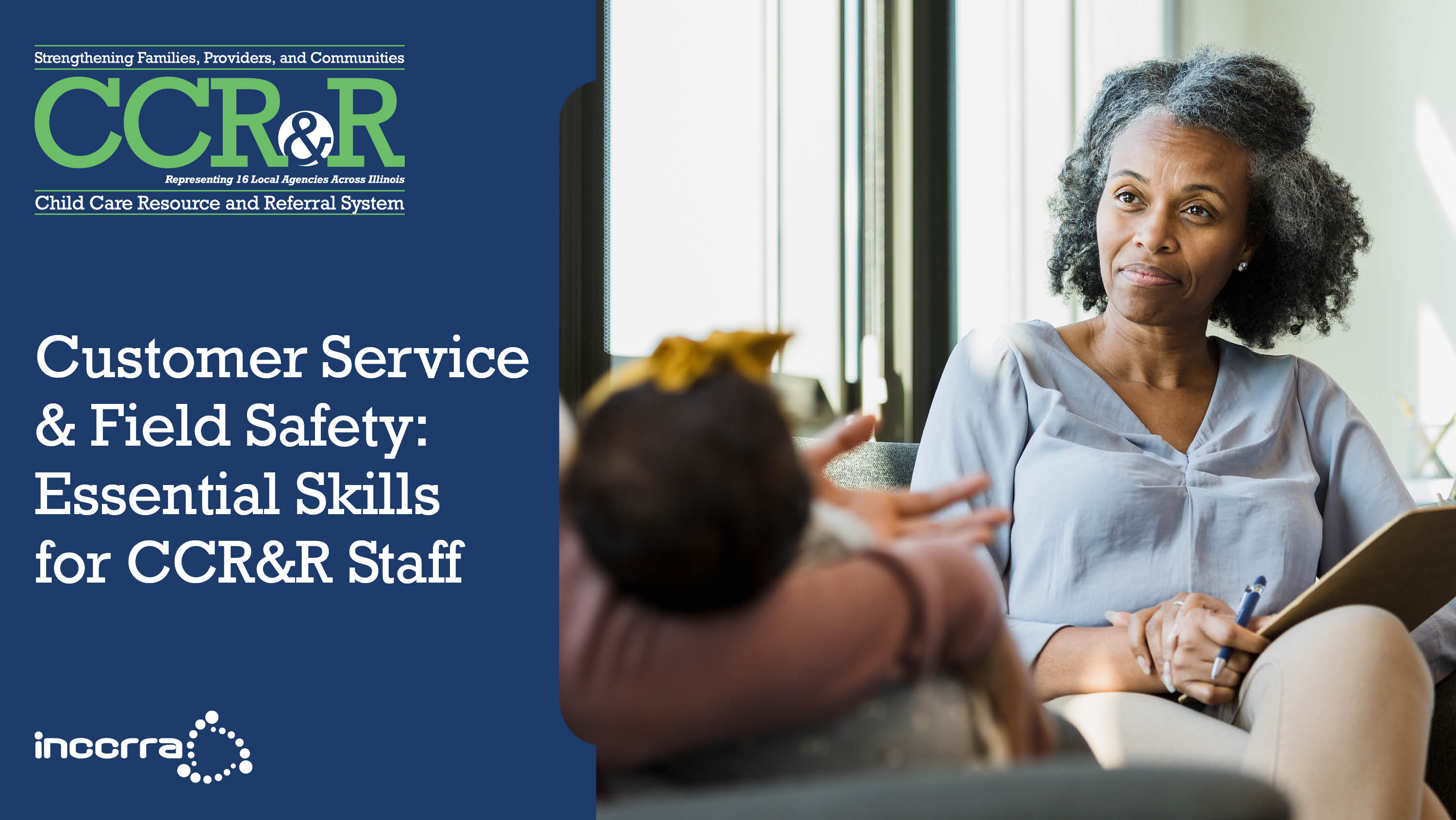
Contact Hours: 1 hour Gateways Content Areas: PPD (1 hour) CDA Content Areas: 6 (1 hour)

This DTP Orientation Course was designed for CCR&R Staff to familiarize themselves with DTP. Students will learn the capabilities of DTP as well as how to enter and modify data into DTP.
Contact Hours: 1 hour
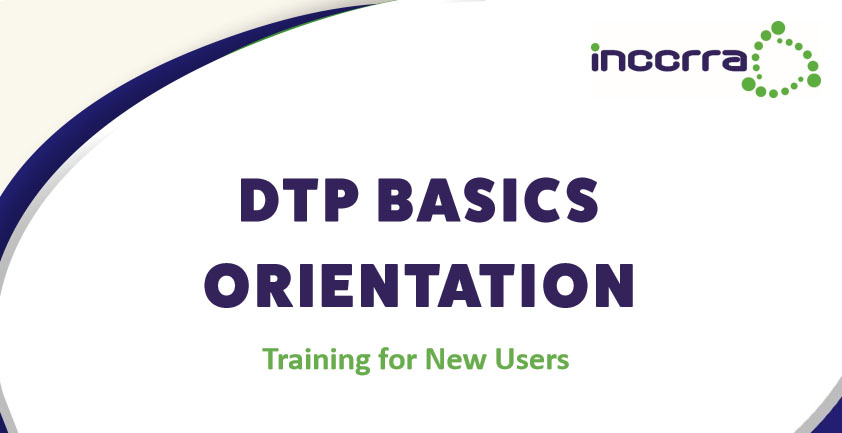
Curiosity and Wonder is the second course in a nine-part series designed to support science competencies in teachers of young children. Please make sure to take the Introduction course before taking this 2nd course in the series. Curiosity and wonder is central to young children’s science explorations and learning. In this course we will examine what curiosity and wonder are and how they can support children in all areas of early science.
This training provides 1 contact hour of Gateways Registry-Approved training and 1 Continuing Professional Development Unit (CPDU).
Please make sure to take the following Early Science Matters Professional Development Program course before you take this course:
Course 1: Introduction
Contact Hours: 1 hour Gateways Content Areas: CPD (1 hour) CDA Content Areas: PI (1 hour)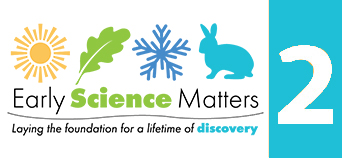
Module 2a - Health Issues for Group Care
Ensuring a child's health and well-being requires more than basic first aid and emergency contacts. In this module, you will learn how to help the growth of healthy children -- from the basics like hand washing to a more in-depth look at various practices surrounding health care.
Contact Hours: 2 hours Gateways Content Areas: HSW (2 hours) CDA Content Areas: 1 (2 hours)Esta capacitación está disponible en español aquí.
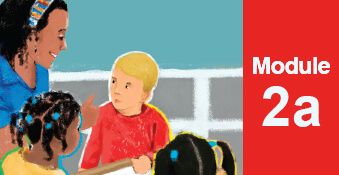
Module 2b - Nutrition Issues for Group Care
Whether you're responsible for providing a quick snack or a well-balanced meal, understanding children's dietary needs creates healthier and happier kids. Learn the basics of good nutrition, food safety and various practices surrounding nutrition through this module.
Contact Hours: 2 hours Gateways Content Areas: HSW (2 hours) CDA Content Areas: 1 (2 hours)Esta capacitación está disponible en español aquí.
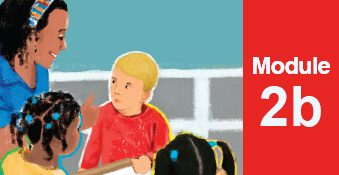
Module 2c - Safety Issues for Group Care
A child's safety is the number one concern for parents and child care providers alike. In this module, you will identify tips for creating a safer group care environment, confront the issue of abuse and neglect and learn more about emergency preparedness and first aid.
Contact Hours: 2 hours Gateways Content Areas: HSW (2 hours) CDA Content Areas: 1 (2 hours)Esta capacitación está disponible en español aquí.
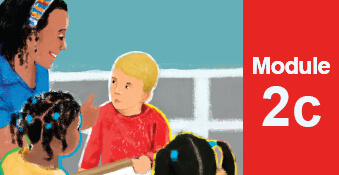
Module 4 - Learning Happens in Relationships
Our kids are constantly responding to family members, teachers, and social relationships that help to shape their understanding of the world around them. This module explores how relationships between families, children and teachers can help learning, and how crafting the environment around them can help children learn.
Contact Hours: 2 hours Gateways Content Areas: CPD (1 hour); IRE (1 hour) CDA Content Areas: 1 (1 hour); 3 (1 hour)Esta capacitación está disponible en español aquí.
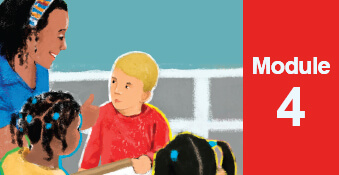
Module 5 - Family and Community Relationships
As our partners in child development, families, and especially parents, directly affect a child's learning. In this module you will learn the new ways of working with parents to help their children enjoy learning. You also will explore the social world of a family to be sure that the learning that takes place in your care is consistent with the learning done at home.
Contact Hours: 2 hours Gateways Content Areas: FCR (2 hours) CDA Content Areas: 4 (2 hours)Esta capacitación está disponible en español aquí.
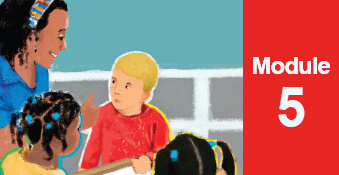
Module 6 - Personal and Professional Development
What does it mean to be a child care professional? How can you be sure you are getting the support and supplies you need? How can you set effective limits with parents and children alike? In this module, you will learn about your own professional development and how to care for yourself so you can continue to care for others.
Contact Hours: 2 hours Gateways Content Areas: PPD (2 hours) CDA Content Areas: 6 (2 hours)Esta capacitación está disponible en español aquí.
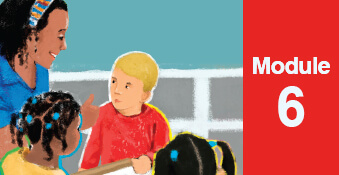
Module 7a - Child Development: Ages Birth to 8 Months
Newborns and young babies are developing at an incredible rate, causing them to have special needs unlike older children. In this module, you will understand how children from birth to 8 months learn and grow, and how to individualize their care accordingly.
Contact Hours: 2 hours Gateways Content Areas: HGD (2 hours) CDA Content Areas: 3 (1 hour); 8 (1 hour)Esta capacitación está disponible en español aquí.
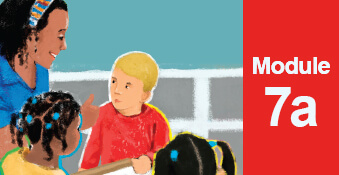
Module 7b - Child Development: Ages 8 to 18 Months
In this continuation of the first child development module, you will explore development among children ages 8-18 months. You'll identify how this age group differs in growth and their approach to learning, and you'll discover toys, games and songs that are helpful and just right for their development.
Contact Hours: 2 hours Gateways Content Areas: HGD (2 hours) CDA Content Areas: 3 (1 hour); 8 (1 hour)Esta capacitación está disponible en español aquí.
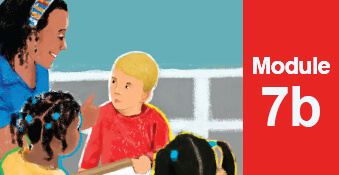
Module 7c - Child Development: Ages 18 to 36 Months
Toddlers are an energetic bunch who require plenty of stimulation and education. In this final section of child development training, you'll explore how children age 18 to 36 months learn language, learn to think, learn to move, and learn feelings, so you can better nurture this often curious age group.
Contact Hours: 2 hours Gateways Content Areas: HGD (2 hours) CDA Content Areas: 3 (1 hour); 8 (1 hour)Esta capacitación está disponible en español aquí.
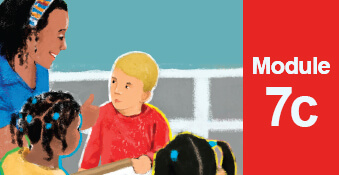
Module 8a - The Preschool-Age Child: Social and Emotional Development
As children approach preschool age, their needs begin to change. This is the first of four modules designed to better understand children as they approach school age. You will identify characteristics of social and emotional development and learn techniques for promoting appropriate and effective discipline for preschool children.
Contact Hours: 2 hours Gateways Content Areas: HGD (2 hours) CDA Content Areas: 3 (2 hours)Esta capacitación está disponible en español aquí.
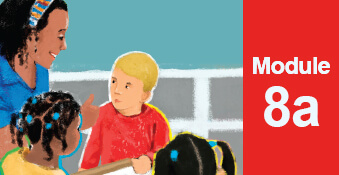
As children mature, their minds aren't the only things growing at an incredible rate. In this module, you will explore the special areas of physical development in preschool-aged children. You also will learn about fine motor activities that will help preschoolers grow into their bodies while developing proper coordination and movement.
Contact Hours: 2 hours Gateways Content Areas: HGD (1 hour); IRE (1 hour) CDA Content Areas: 2 (2 hours)Esta capacitación está disponible en español aquí.
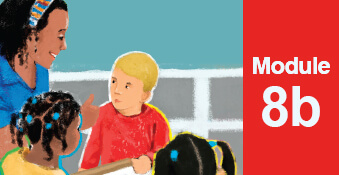
Module 8d - The Preschool-Age Child: Cognitive Development
In this module on preschool development, you will dive deeper into how preschoolers learn and identify tips for making learning fun. With suggestions for activities that encourage your preschoolers to explore numbers, shapes, colors and science, this module gives all the information you need to grow and stretch the ability of children to think and understand.
Contact Hours: 2 hours Gateways Content Areas: HGD (1 hour); CPD (1 hour) CDA Content Areas: 2 (2 hours)Esta capacitación está disponible en español aquí.
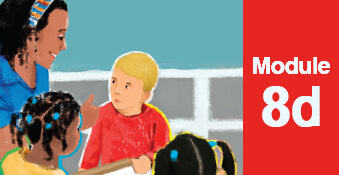
Module 9 - School-Age Development
This module on child development looks at school-age children to uncover how their learning and growth differs. With tips on how to better care for school-aged youth, this module offers you guidance on how to set rules and limits and to get your school-aged kids to appreciate safety and respect.
Contact Hours: 2 hours Gateways Content Areas: HGD (1 hour); CPD (1 hour) CDA Content Areas: 2 (1 hour); 8 (1 hour)Esta capacitación está disponible en español aquí.
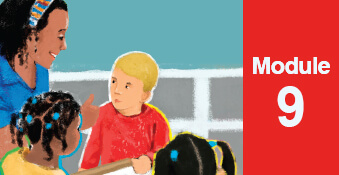
Module 2a - Health Issues for Group Care
Ensuring a child's health and well-being requires more than basic first aid and emergency contacts. In this module, you will learn how to help the growth of healthy children -- from the basics like hand washing to a more in-depth look at various practices surrounding health care.
Contact Hours: 2 hours Gateways Content Areas: HSW (2 hours) CDA Content Areas: 1 (2 hours)Module 2b - Nutrition Issues for Group Care
Whether you're responsible for providing a quick snack or a well-balanced meal, understanding children's dietary needs creates healthier and happier kids. Learn the basics of good nutrition, food safety and various practices surrounding nutrition through this module.
Contact Hours: 2 hours Gateways Content Areas: HSW (2 hours) CDA Content Areas: 1 (2 hours)Module 2c - Safety Issues for Group Care
A child's safety is the number one concern for parents and child care providers alike. In this module, you will identify tips for creating a safer group care environment, confront the issue of abuse and neglect and learn more about emergency preparedness and first aid.
Contact Hours: 2 hours Gateways Content Areas: HSW (2 hours) CDA Content Areas: 1 (2 hours)Module 4 - Learning Happens in Relationships
Our kids are constantly responding to family members, teachers, and social relationships that help to shape their understanding of the world around them. This module explores how relationships between families, children and teachers can help learning, and how crafting the environment around them can help children learn.
Contact Hours: 2 hours Gateways Content Areas: CPD (1 hour); IRE (1 hour) CDA Content Areas: 1 (1 hour); 3 (1 hour)Module 5 - Family and Community Relationships
As our partners in child development, families, and especially parents, directly affect a child's learning. In this module you will learn the new ways of working with parents to help their children enjoy learning. You also will explore the social world of a family to be sure that the learning that takes place in your care is consistent with the learning done at home.
Contact Hours: 2 hours Gateways Content Areas: FCR (2 hours) CDA Content Areas: 4 (2 hours)Module 6 - Personal and Professional Development
What does it mean to be a child care professional? How can you be sure you are getting the support and supplies you need? How can you set effective limits with parents and children alike? In this module, you will learn about your own professional development and how to care for yourself so you can continue to care for others.
Contact Hours: 2 hours Gateways Content Areas: PPD (2 hours) CDA Content Areas: 6 (2 hours)Module 7a - Child Development: Ages Birth to 8 Months
Newborns and young babies are developing at an incredible rate, causing them to have special needs unlike older children. In this module, you will understand how children from birth to 8 months learn and grow, and how to individualize their care accordingly.
Contact Hours: 2 hours Gateways Content Areas: HGD (2 hours) CDA Content Areas: 3 (1 hour); 8 (1 hour)Module 7b - Child Development: Ages 8 to 18 Months
In this continuation of the first child development module, you will explore development among children ages 8-18 months. You'll identify how this age group differs in growth and their approach to learning, and you'll discover toys, games and songs that are helpful and just right for their development.
Contact Hours: 2 hours Gateways Content Areas: HGD (2 hours) CDA Content Areas: 3 (1 hour); 8 (1 hour)Module 7c - Child Development: Ages 18 to 36 Months
Toddlers are an energetic bunch who require plenty of stimulation and education. In this final section of child development training, you'll explore how children age 18 to 36 months learn language, learn to think, learn to move, and learn feelings, so you can better nurture this often curious age group.
Contact Hours: 2 hours Gateways Content Areas: HGD (2 hours) CDA Content Areas: 3 (1 hour); 8 (1 hour)As children mature, their minds aren't the only things growing at an incredible rate. In this module, you will explore the special areas of physical development in preschool-aged children. You also will learn about fine motor activities that will help preschoolers grow into their bodies while developing proper coordination and movement.
Contact Hours: 2 hours Gateways Content Areas: HGD (1 hour); IRE (1 hour) CDA Content Areas: 2 (2 hours)Module 8d - The Preschool-Age Child: Cognitive Development
In this module on preschool development, you will dive deeper into how preschoolers learn and identify tips for making learning fun. With suggestions for activities that encourage your preschoolers to explore numbers, shapes, colors and science, this module gives all the information you need to grow and stretch the ability of children to think and understand.
Contact Hours: 2 hours Gateways Content Areas: HGD (1 hour); CPD (1 hour) CDA Content Areas: 2 (2 hours)Module 9 - School-Age Development
This module on child development looks at school-age children to uncover how their learning and growth differs. With tips on how to better care for school-aged youth, this module offers you guidance on how to set rules and limits and to get your school-aged kids to appreciate safety and respect.
Contact Hours: 2 hours Gateways Content Areas: HGD (1 hour); CPD (1 hour) CDA Content Areas: 2 (1 hour); 8 (1 hour)Module 8a - The Preschool-Age Child: Social and Emotional Development
As children approach preschool age, their needs begin to change. This is the first of four modules designed to better understand children as they approach school age. You will identify characteristics of social and emotional development and learn techniques for promoting appropriate and effective discipline for preschool children.
Contact Hours: 2 hours Gateways Content Areas: HGD (2 hours) CDA Content Areas: 3 (2 hours)The benefits of strong family and community engagement practices in the child care setting will be presented in the course. Participants will identify the strengths of current family and parent policies, as well as determine strategies to develop a strengths-based family and community engagement plan.
Contact Hours: 3 hours Gateways Content Areas: FCR (3 hours) CDA Content Areas: 4 (3 hours)
Esta capacitación está disponible en español aquí.

In this training, Family Child Care Credential: Creating Your Family Child Care Routines and Schedules, participants will learn to describe the importance of routines and schedules in a family child care program, identify essential components of effective routines and schedules, and create sample routines and schedules that will support healthy development, learning, and well-being in a family child care program.
Topics include:
- Importance of Routines and Schedules
- Balancing Needs
- Developing Effective Schedules
- Daily Routines
- Transitions
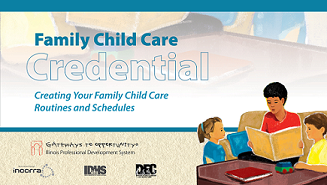
In this training, Family Child Care Credential: Foundations of Family Child Care Business Operations, participants will learn to describe and identify compliance requirements related to the Illinois Department of Children and Family Services (IDCFS) licensing standards for day care homes and group day care homes, identify where to locate essential health and safety requirements for family child care operation, and identify and communicate emergency and disaster preparedness plans and training requirements for family child care providers.
Topics include:
· Licensing Considerations
· Training Requirements
· Insurance Considerations
· Health and Safety Requirements
· Emergency Plan Development
Contact Hours: 2 hours Gateways Content Area: CPD (2 hours) CDA Content Area: Program Management (2 hours)
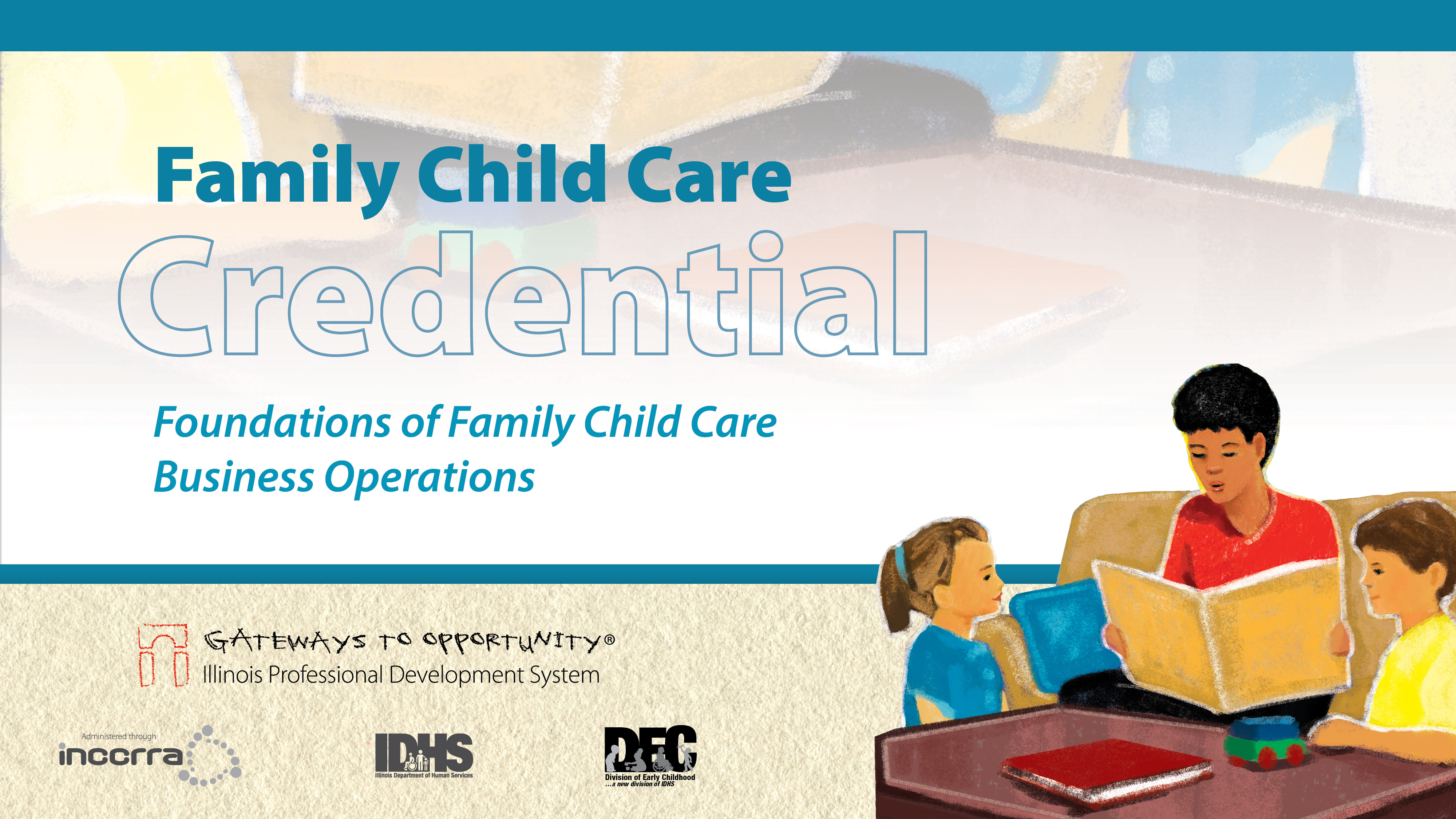
In this training, Family Child Care Credential: Planning Your Family Child Care Environment, participants will learn to describe and identify strategies to create a family child care environment that supports multiple uses, including: providing quality care for a mixed age group of children, managing a successful home business, and meeting the needs of their own family.
Topics include:
- Foundations of effective planning
- Environmental health and safety
- Importance of the daily schedule
- Planning your outdoor learning environment
- Furniture and material selection
Contact Hours: 2 hours Gateways Content Area: CPD (2 hours) CDA Content Area: Program Management (2 hours)
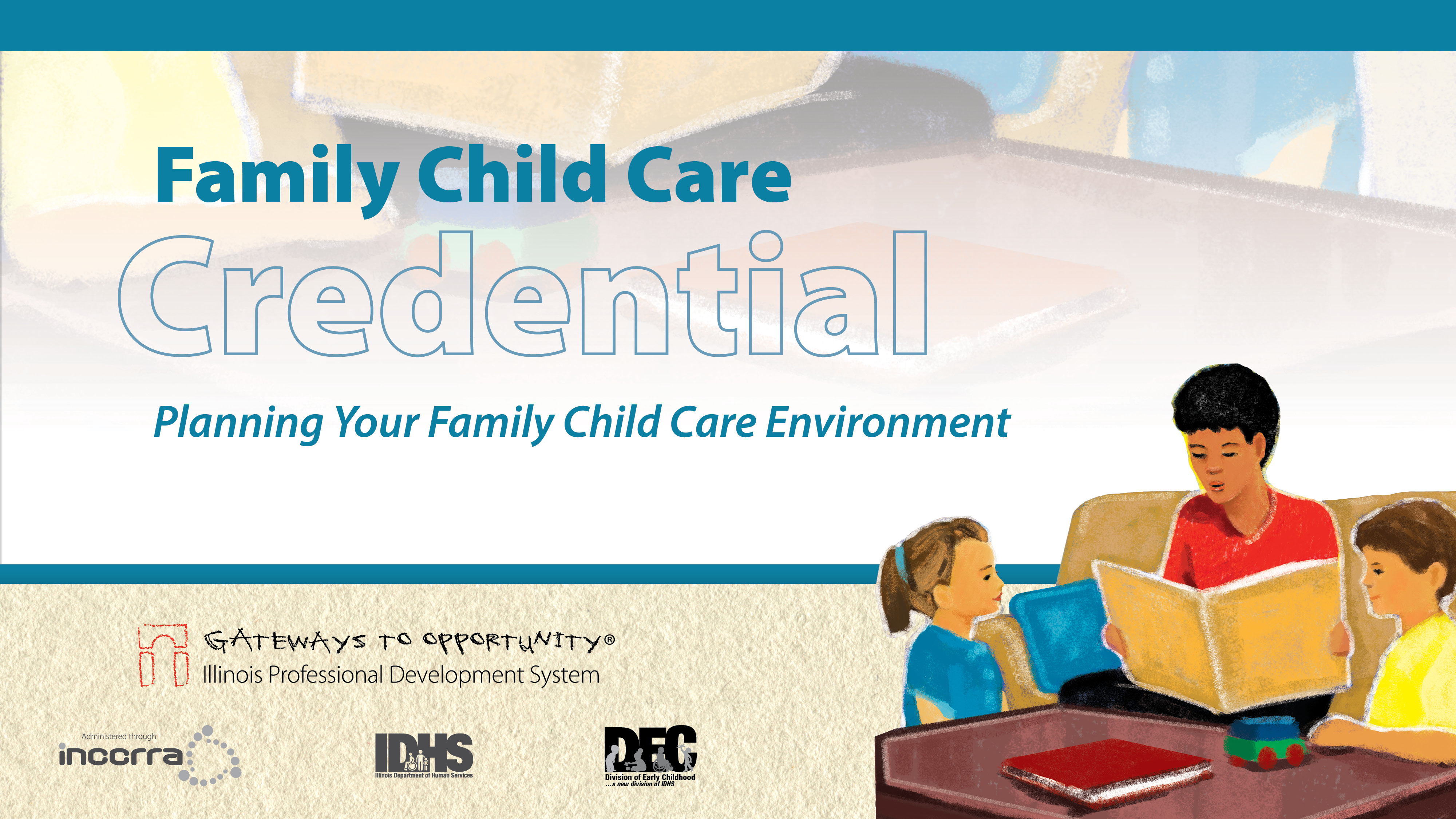
In this training, Family Child Care Credential: Technology in the Family Child Care Environment: Ensuring Appropriate Use, Security, and Safety, participants will be able to identify strategies that ensure safe, secure, and appropriate use of technology. You will learn to explore strategies to document as well as communicate through technology in your program.
Topics include:
- Appropriate Use
- Security
- Safety
- Using Technology to Document and Plan
- Developing a Technology Policy
Contact Hours: 2 hours Gateways Content Area: CPD (2 hours) CDA Content Area: Program Management (2 hours)
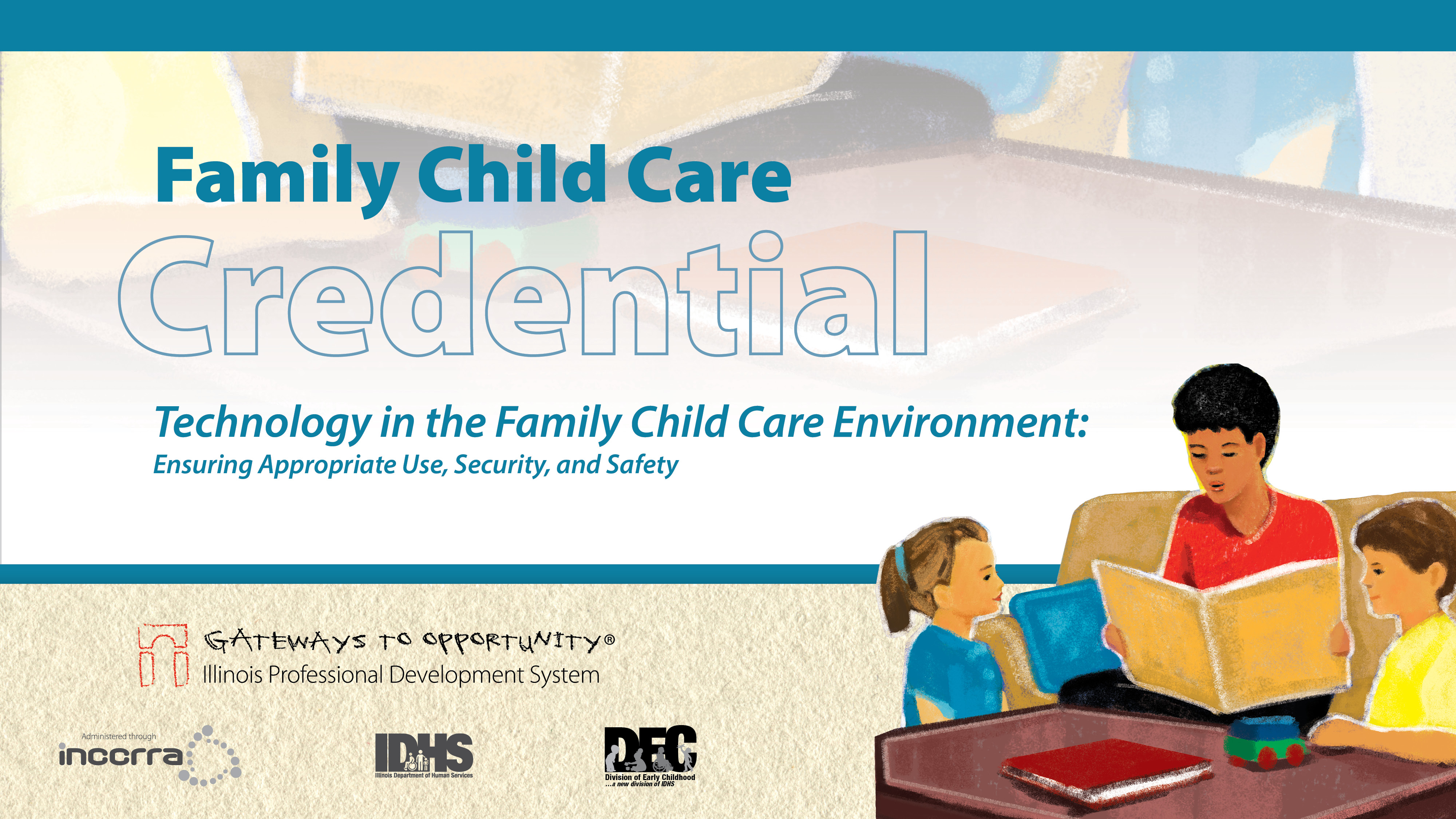
Quality matters in child care. Learn about the statewide Gateways Training Tiers (GTT) for license exempt family child care providers, a program to help improve quality of care. The Orientation covers GTT eligibility and training requirements, application process, and supports and resources available. Providers serving children on the State Child Care Assistance Program (CCAP) may also receive a bonus to the standard payment rate. A provider must attend this session prior to applying to the Gateways Training Tiers.
Contact Hours: 1 hour Gateways Content Areas: CPD (1 hour) CDA Content Areas: 5 (1 hour)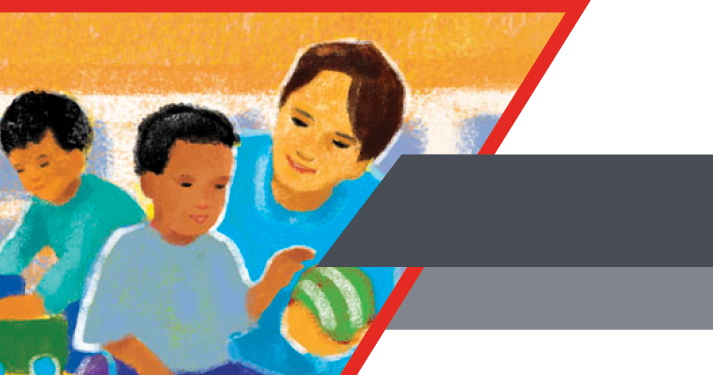

This online course is an introduction to the Illinois Early Learning Guidelines for Birth to Age Three (IELG). The content in this course will cover the history, purpose and role of the Illinois Early Learning Guidelines, aid participants in developing a working knowledge of IELG and provide resources for the implementation of the IELG.
Contact Hours: 3 hours Gateways Content Areas: HGD (1 hour); OA (1 hour); IRE (1 hour) CDA Content Areas: SE(1 hour); OB (1 hour); CD (1 hour)Esta capacitación está disponible en español aquí.

Welcome to "Infant/Early Childhood Mental Health Consultation: A Guide for Illinois Programs". This training will present an overview of the purpose and role of an Infant/Early Childhood Mental Health Consultant in Illinois child care settings. Participants will be introduced to the different types of consultation and the benefits of adding consultation to their program. Participants will also learn how to access consultation services by using available funding and resources.
Contact Hours: 1 Gateways Content Areas: Family and Community Relationships - FCR (1 hour) CDA Hours: 6 Professionalism (1 hour)

Midwest Pesticide Action Center, in collaboration with the Illinois Network of Child Care Resource and Referral Agencies, has developed an online learning module to provide all Illinois child care providers with an overview of pest control strategies and requirements. In this presentation, you will become familiar with what the laws are for pest control in child care programs, be provided with a general overview of what Integrated Pest Management (IPM) is, and receive a list of the basic steps for putting an IPM program in place. Ultimately, the goal of this presentation is to provide you with the tools you need to reduce the exposure of you and the children you care for to pests and pesticides.
Contact Hours: 1 hour Gateways Content Areas: HSW (1 hour) CDA Content Areas: 1 (1 hour)
A Systems Framework: Understanding the Process of I/ECMH Consultation
This module addresses the systems that I/ECMHC interfaces with. Participants will learn about system’s perspectives generally and begin to understand the settings that I/ECMH consultants work within, both formal and informal. The module explores how learning and change take place and supports consultants toward understanding their role and their relationships as change agents toward better child and family outcomes within a systems context.
Contact Hours: 2 Hours Gateways Content Area: PPD (2hours) CDA Hours: 6(2 hours)

Attachment Theory: Recognizing
Patterns and Behaviors
This module will introduce the learner to attachment theory and its history. Attachment patterns and how they are assessed will be reviewed. The learner will have the opportunity to observe children with both secure and insecure patterns of attachment through video recordings. Characteristics of infants and young children with each of the four primary attachment patterns will be described as well as characteristics of caregivers of children in the four primary attachment categories.
Contact Hours: 3 Hours Gateways Content Area: Personal and Professional Development (2 hours) and Observation and Assessment (1 hour) CDA Hours: 6- Professionalism (2 hours) and 7-Observing/Recording Behavior (1 hour)

Exploring the Types of I/ECMH Consultation
This module will introduce the learner to the key types of infant/early childhood mental health consultation services and the various settings and contexts to which they apply. The learner will gain strategies for discerning the level and type of service appropriate for specific referrals for I/ECMHC in different settings to be most effective. The learner will have the opportunity to look at consultation through a varying lens of services by observing a child/classroom setting through video recording.
Contact Hours: 2 Hours Gateways Content Area: PPD (2hours) CDA Hours: 6(2 hours)

Supporting Teachers in Consultation by Mastering Principles of Adult Learning Theory
Designed to introduce an understanding of the Principles of Adult Learning in the I/ECMH Consultant’s role. Because adult learners receive information differently, it is important to understand what is required when working with them in consultation. Consultants in this training will build a foundation for their work with teachers by exploring the various types of learning theories and discovering strategies for their use. Information learned in this training will assist the consultant in supporting teachers’ goals of enhancing children’s social, emotional, and mental development by enhancing the social, emotional, and mental climate of their classroom.
Contact Hours: 2 Hours Gateways Content Area: PPD (2hours) CDA Hours: 6(2 hours)This is the assessment portion of the PITC Module 3: Learning and Development course. Participants will receive credit for the PITC Module 3 training upon completion of this portion of the course.
Contact Hours: 1
Gateways Content Area & Credential Competency: ITC - HGD1, HGD2, CPD2
Esta es la parte de evaluación del curso Módulo PITC 3: Aprendizaje y desarrollo. Los participantes recibirán crédito por la capacitación del Módulo 3 del PITC al finalizar esta parte del curso.
Horas de contacto: 1
Áreas de contenido de Gateways y Competencia de credenciales: ITC - HGD1, HGD2, CPD2
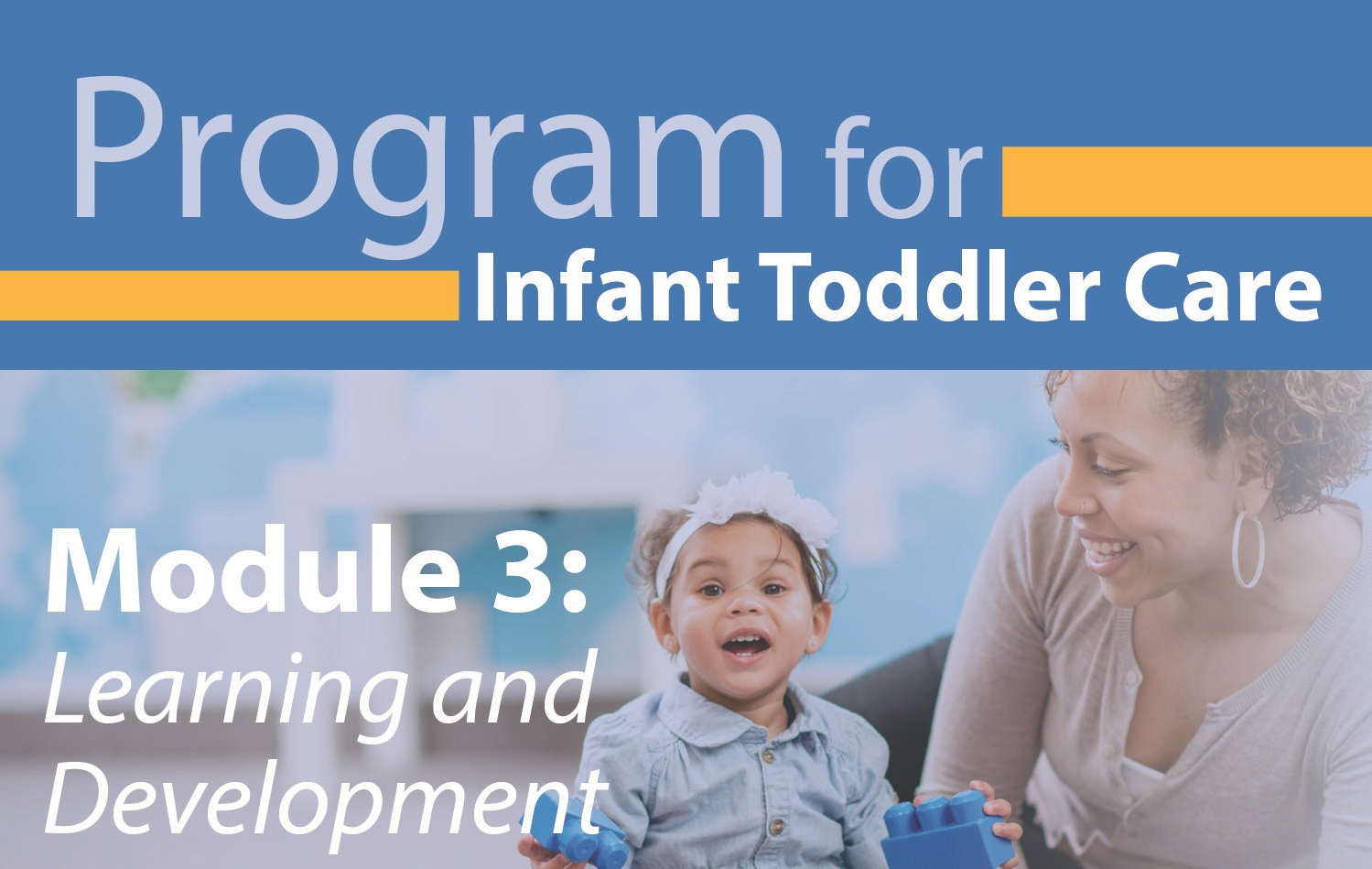
This is the assessment portion of the PITC Module 3: Learning and Development course. Participants will receive credit for the PITC Module 3 training upon completion of this portion of the course.
Contact Hours: 1
Gateways Content Area & Credential Competency: ITC - HGD1, HGD2, CPD2
Esta es la parte de evaluación del curso Módulo PITC 3: Aprendizaje y desarrollo. Los participantes recibirán crédito por la capacitación del Módulo 3 del PITC al finalizar esta parte del curso.
Horas de contacto: 1
Áreas de contenido de Gateways y Competencia de credenciales: ITC - HGD1, HGD2, CPD2

This is the assessment portion of the PITC Module 3: Learning and Development course. Participants will receive credit for the PITC Module 3 training upon completion of this portion of the course.
Contact Hours: 1
Gateways Content Area & Credential Competency: ITC - HGD1, HGD2, CPD2
Esta es la parte de evaluación del curso Módulo PITC 3: Aprendizaje y desarrollo. Los participantes recibirán crédito por la capacitación del Módulo 3 del PITC al finalizar esta parte del curso.
Horas de contacto: 1
Áreas de contenido de Gateways y Competencia de credenciales: ITC - HGD1, HGD2, CPD2

This is the assessment portion of the PITC Module 3: Learning and Development course. Participants will receive credit for the PITC Module 3 training upon completion of this portion of the course.
Contact Hours: 1
Gateways Content Area & Credential Competency: ITC - HGD1, HGD2, CPD2
Esta es la parte de evaluación del curso Módulo PITC 3: Aprendizaje y desarrollo. Los participantes recibirán crédito por la capacitación del Módulo 3 del PITC al finalizar esta parte del curso.
Horas de contacto: 1
Áreas de contenido de Gateways y Competencia de credenciales: ITC - HGD1, HGD2, CPD2

Preschool children are developing quickly in all areas. This session will discuss how providers can support their development by helping them interact within their worlds on many levels: through their senses, through play, and through movement. Their experiences create a framework for learning that will carry them through later stages of development and into adulthood.
This Registry-approved training is brought to you by Gateways to Opportunity.
Contact Hours : 2 hours Gateways Content Area: HGD (2 hours) CDA Content Area: 8 (2 hours)
Find resources and tools to assist you in completing your online learning.
Trauma-Informed Practice for Child Care Providers explores concepts in a variety of areas including infant/early childhood mental
health, social emotional development of young children, and trauma and adverse childhood experiences. You will look at indicators and benchmarks
and ways to foster social emotional learning in culturally
responsive ways. This training meets the DCFS requirement for trauma-informed care.
Contact Hours: 2 hours Gateways Content Areas: HSW (2 hours) CDA Content Areas: Health & Safety (1 hour) and Social/Emotional (1 hour)
Esta capacitación está disponible en español aquí.
